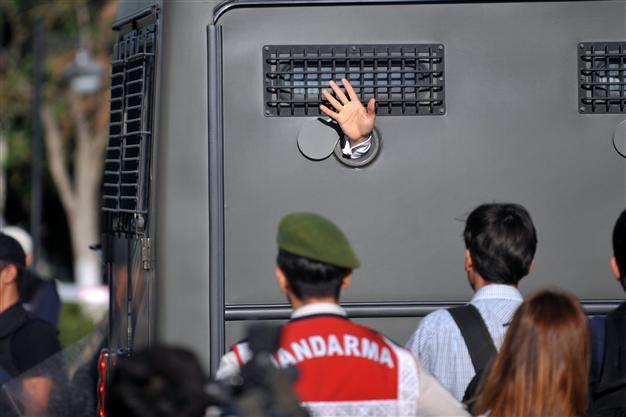Ergenekon trial not political: Turkish justice minister
ISTANBUL

An Ergenekon prisoner being driven in a police armoured vehicle waves at protestors on Aug. 5. The Ergenekon coup plot trial, considered the most important legal battle in recent Turkish history, reached an end Aug. 5 after Istanbul’s 13th High Criminal Court handed down severe punishments, including a life sentence for former Chief of General Staff Gen. İlker Başbuğ. AFP photo
Justice Minister Sadullah Ergin has rejected criticisms of the Ergenekon verdict handed down by a special Istanbul court Aug. 5, which mainly denounce the trial as political rather than a judicial case."[Calling Ergenekon] a political trial is a comment that is over the line. The trial may have political consequences as a result but its content is very technical," Ergin said in remarks to private broadcaster Habertürk Aug. 6, noting that an appeal process was open.
"Those who are disturbed by the Ergenekon rulings can go to a higher court," he added.
Other Justice and Development Party (AKP) figures however responded favorably to the rulings with Prime Minister Recep Tayyip Erdoğan's chief political adviser, Yalçın Akdoğan, describing the coup case as a "turning point for Turkish democracy."
"This case is calling to account the spirit of intervention which floated through from May 27 to March 12, from Sept. 12 to April 27. The Ergenekon case does not only call to account an illegal attempt, but also the ward-like understanding that in time sneaked into the structure of the state," Akdoğan posted on his personal Twitter account.
Turkey has achieved "a great historic act" in making coup attempts subject to the judiciary, Akdoğan added.
'Important test in democracy'
Deputy Prime Minister Bekir Bozdağ also described the case as historic, saying, "Turkey passed an important test in democracy and the rule of law."
"No court rules on a verdict without evidence. The court rules only by the Constitution, the law, the evidence and by the will of conscience," Bozdağ said, while accusing opposition figures who have been voicing discontent with the court's rulings of "fanaticism."
EU Minister Egemen Bağış continued to reflect on the case over his personal Twitter account, where he spoke of the process as "good for Turkey's democracy."
"If coups and attempts in 1960, 1971 and 1980 had been put on trial, the Feb. 28 and April 27 processes would have never happened. The pains of the past should not be repeated in the future," Bağış said.
Deputy Prime Minister Bülent Arınç also called for the court's decision to be respected during a press conference after the weekly Cabinet meeting yesterday.
The Ergenekon coup plot trial, considered the most important legal battle in recent Turkish history, reached an end Aug. 5 after Istanbul’s 13th High Criminal Court handed down severe punishments, including a life sentence for former Chief of General Staff Gen. İlker Başbuğ.
The verdict trial, which decided the fate of 275 suspects at the end of the five-year process, resulted in hundreds of years of imprisonment in total and several aggravated life sentences for a series of the country’s high-ranking army members, journalists and academics.
















